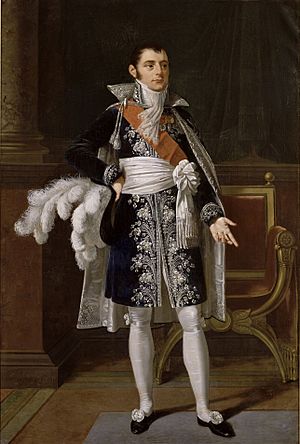Anne Jean Marie René Savary facts for kids
Anne Jean Marie René Savary was an important French military officer and diplomat. He lived from 1774 to 1833. He fought in several big wars, like the French Revolutionary Wars and the Napoleonic Wars. He also served as France's Minister of Police for a few years.
Quick facts for kids
Anne Jean Marie René Savary
|
|
|---|---|

Portrait by Robert Lefèvre, 1814
|
|
| Born | 26 April 1774 Marcq |
| Died | 2 June 1833 (aged 59) Paris |
| Allegiance | France |
| Rank | General de division |
| Commands held | Gendarmes d'élite de la Garde Impériale |
| Battles/wars | French Revolutionary Wars Napoleonic Wars French conquest of Algeria |
| Signature | |
Contents
Early Life and Military Start
Savary was born in Marcq, France, in 1774. He went to school in Metz. In 1790, he joined the French royal army. His first military action was in 1792. He fought under different generals, like General Custine and General Moreau. He showed great skill during Moreau's difficult retreat from a place called Swabia.
In 1797, he became a chef d'escadron. This was a rank similar to a major in the cavalry. He then joined the Egyptian campaign with General Louis Desaix. Savary wrote about his experiences in this campaign.
Savary showed his talents again at the Battle of Marengo in 1800. He was with General Desaix. After Desaix died in the battle, Savary's loyalty impressed Napoleon Bonaparte. Napoleon was then the First Consul of France. Savary was chosen to lead the Elite Gendarmes of the Consular Guard.
Savary was very good at finding out secrets. He helped uncover a plot against Napoleon by Georges Cadoudal and Jean-Charles Pichegru. Later, Savary was in charge at Château de Vincennes. He was involved in a controversial event there, the execution of the Duc d'Enghien.
Savary in the Napoleonic Wars
In 1805, Savary was promoted to General of Division. This was a very high rank. Before the Battle of Austerlitz in December 1805, Napoleon sent Savary to talk to Emperor Alexander I. Savary asked for a ceasefire. After the battle, Savary went to Alexander again and convinced him to agree to a ceasefire.
In 1806, Savary was very brave in chasing the Prussian army after the Battle of Jena. He also helped with talks during the Siege of Hameln. In 1807, he led a group of soldiers and won an important battle at Ostrolenka.
After the Treaty of Tilsit was signed in 1807, Savary became the French ambassador to St. Petersburg. However, he was soon replaced. Napoleon then gave him the title of Duke of Rovigo. This title came from a small town in Italy.
Savary then went to Madrid to help Napoleon with his plans for Spain. He worked with Joachim Murat. Savary helped convince the Spanish king, Charles IV of Spain, and his son, Ferdinand VII of Spain, to give their claims to the throne to Napoleon. Savary persuaded Ferdinand to travel to Bayonne. This decision led to Ferdinand losing his crown and his freedom until 1814.
In 1808, Savary went with Napoleon to a big meeting with Alexander I at the Congress of Erfurt. In 1809, he took part in a war against Austria.
In 1810, Savary became the Minister of Police. He was very loyal to Napoleon. He made the police office very strict. During his time, Napoleon ordered the exile of Madame de Staël. He also ordered her book De l'Allemagne to be destroyed.
Savary faced a strange challenge in 1812. A general named Claude François de Malet tried to take over the government. Malet's helpers captured Savary while he was sleeping. They held him for a few hours. This event made Savary look a bit foolish. Napoleon later gave him a special hereditary title, Duché grand-fief of Rovigo.
Later Life and Return to France
Savary was one of the last people to leave Napoleon when he gave up his power in 1814. He was also one of the first to welcome Napoleon back during the Hundred Days in 1815. During this time, he became a general inspector of the police and a Peer of France.
After the Battle of Waterloo, Savary went with Napoleon to Rochefort. He sailed with him on the ship HMS Bellerophon. Savary was not allowed to go to Saint Helena with Napoleon. Instead, he was held in Malta for several months. He managed to escape from Malta and traveled to Smyrna. He lived there for a while. After some time, he was allowed to return to France. He later settled in Rome.
In 1830, a new revolution in France, the July Revolution, brought Savary back into favor. In 1831, he took command of the French army in Algeria. While in Algeria, he had disagreements with French officials. He was also involved in some harsh actions against local Arab leaders. Because of his poor health, he had to return to France. He died in Paris in June 1833.
See Also
 In Spanish: Anne Jean Marie René Savary para niños
In Spanish: Anne Jean Marie René Savary para niños
- Massacre of El Ouffia
- Maximilien Joseph Schauenburg
 | Laphonza Butler |
 | Daisy Bates |
 | Elizabeth Piper Ensley |

